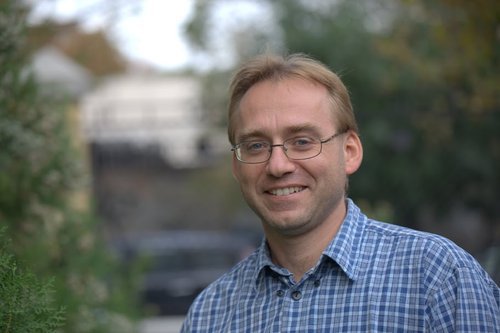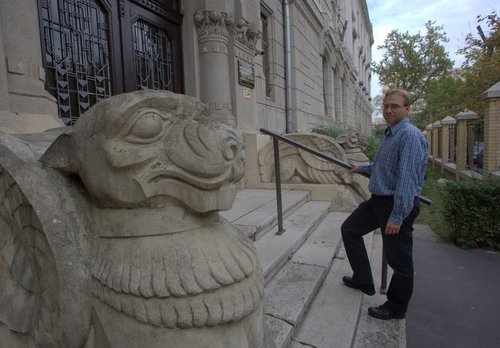We are in a process of revision. For the coordination of the process the Church Revision Committee was installed by the Synod in 2012, commissioned both to develop an ecclesiological basis for the future church life and for the expected reconfiguration - even restructuring - of the church, and to lead us through the implementation. The first committee report will be discussed at the November session of the Synod. At its first meeting in April 2012, the committee elected Rev. Dr. András Harmathy as its convener. András is local pastor in a city close to Budapest and holds a doctor in ministry in missiology. Ha was interviewed in Debrecen by the Church Magazine "In Community".
Prediction of Threatening Conditions, Encouraging Experiences

How long has the Church Revision Committee been running and who are its members? Whose idea was it to found this committee, and how did they determine membership?
This spring, during the meeting of its General Synod, the Reformed Church in Hungary launched the Church Revision Committee. Last year, they held a workshop-like, so-called Thematic Synod, to discuss issues and questions that could not be addressed during the regularly scheduled Synod meetings. These topics were focused on the future of the church and on the "prediction of threatening conditions" caused by social changes. The Synod members felt that there were no substantial solutions created during the Thematic Synod, but because of the importance of these questions, and the issues they raised, there must be a forum to continue the discussion. This is the reason the committee was established. The Church Revision Committee consists of two different types of members. One part of the committee consists of current Synod members(conveners of other Synod committees), the other part is made up of outside professionals elected and voted upon by the Synod. The thought behind the membership structure is firstly a concept of continuity - the future church image, structure and service must be connected to the present-day - and secondly that our church must always be open for renewal. The concept of balance allowed us to incorporate ministers, sociologists, doctors, lawyers, engineers and teachers in the committee.
What authority does the committee have to do its work, and do you see the committee's work producing visible results?
The Synod broadly defined the responsibilities of the committee, in order to cover issues in different fields such as church structure, finance, liturgy and church regulation.
Understandably the Synod did not want to tie the committee's hands and tell them which subject of church life can be discussed or rethought and which cannot - there are no taboo topics. It is a necessary starting point, from the work perspective, but at the same time it is also confusing: how is it possible to see through, understand and get to know the diverse reality of church life in detail and context?
What is the strategy to employ to understand the whole church and its activities? Which perspective should we use to rethink and reform everything?
We are at the beginning of this challenging work. We have just started to understand our responsibility.
Is there a deadline for the launch of the database compiling good practices and good examples for ministry?
It would be a problem, if setting up the committee means, "now there is someone who is working on our current unsolvable problems and future plans, so we are free to think about other issues and we can continue to live the same way we did before." This is not the case. The Church Revision Committee is not the only forum searching for direction surrounded by changing conditions. The Liturgical Reform its proceeding on its path, the Mission Committees are also doing their work. Collecting good examples is important to everyone, too. The Synod will create a database of these examples, which will be finished in the next few weeks.

Personally, which step of the church reform would you start now?
This spring I received a doctoral degree in missiology. I studied the question of how a local congregation could help its members live out their faith through their work. If it was up to me, I would work with all my strength to redefine church membership so it means the same as confessing Christianity and discipleship, which is not limited to just witnessing your faith to the world, but your faith is shown through the way you live your life.
Is this extraordinary opportunity, that you and your colleagues were given the responsibility to raise questions and searching for answers, inspiring your everyday life?
When I accepted the invitation to participate in this committee, I felt like a door opened in front of me. I was happy for the opportunity. Now, as we entered this door and the committee has started working, I am no longer filled with enthusiasm, but the feeling of vertigo: the task we undertook is unpredictable. When we have passed the beginning stages, if we are no longer looking for suitable work instruments in order to continue, then this strange feeling will disappear. I hope so. Until then, just the opposite is true. During my everyday life I experience is that Jesus Christ is collecting, keeping and guiding his followers, and encouraging me to continue to look hopefully towards the future, both for me and for the Reformed Church in Hungary.
Interview of Veronika Tóth-Mihala
Translated by Ecumenical Office of RCH
The interview was published in Közösség, magazine of Debrecen Reformed Presbitery.